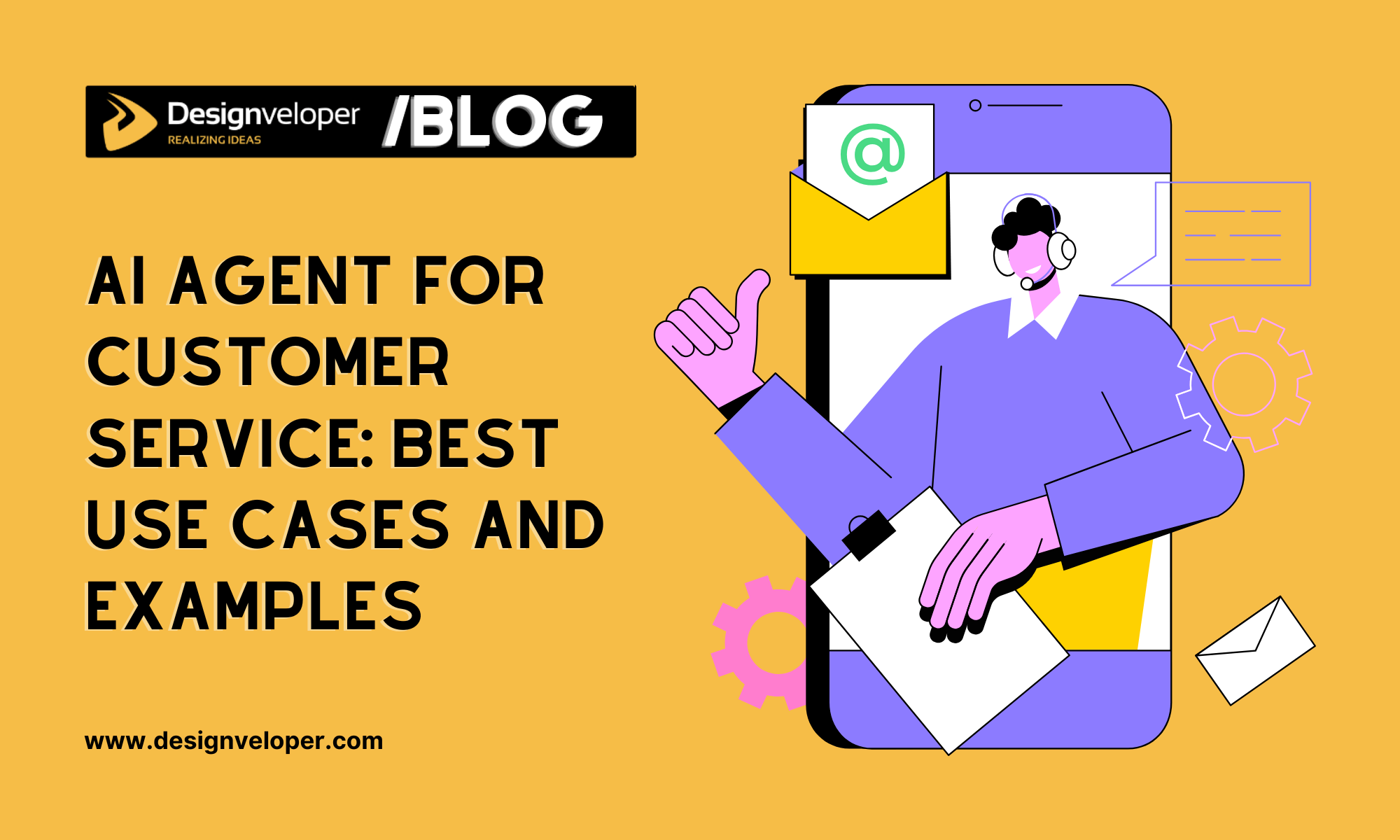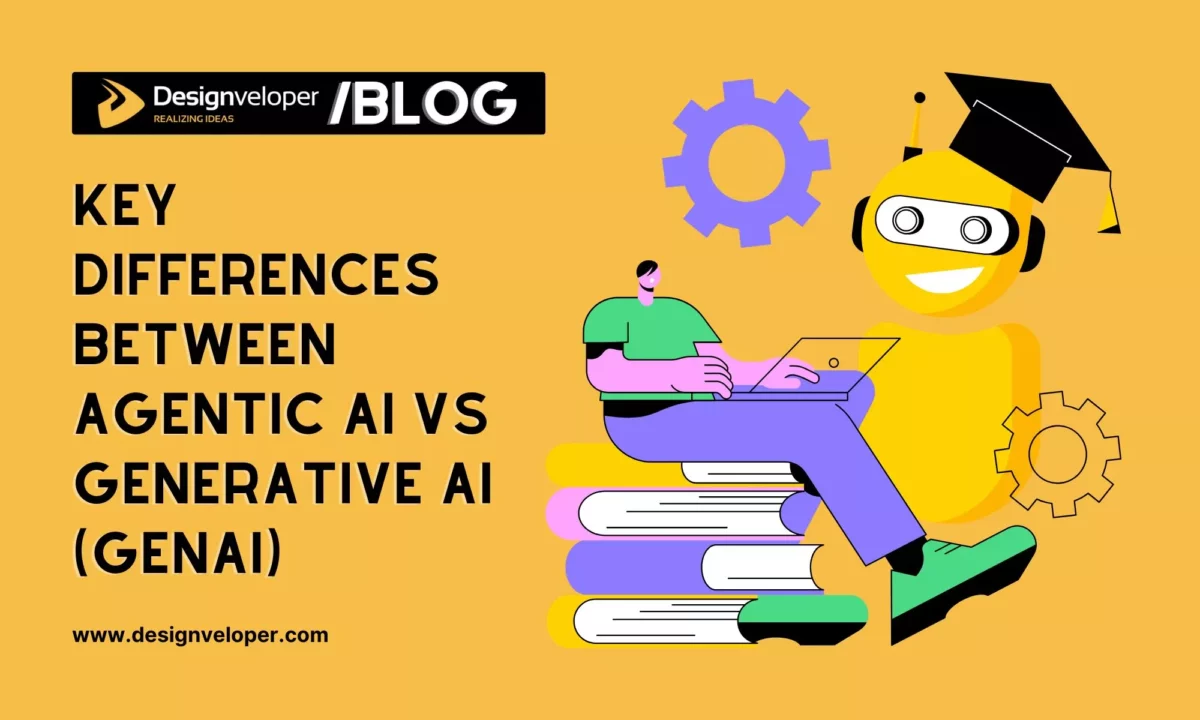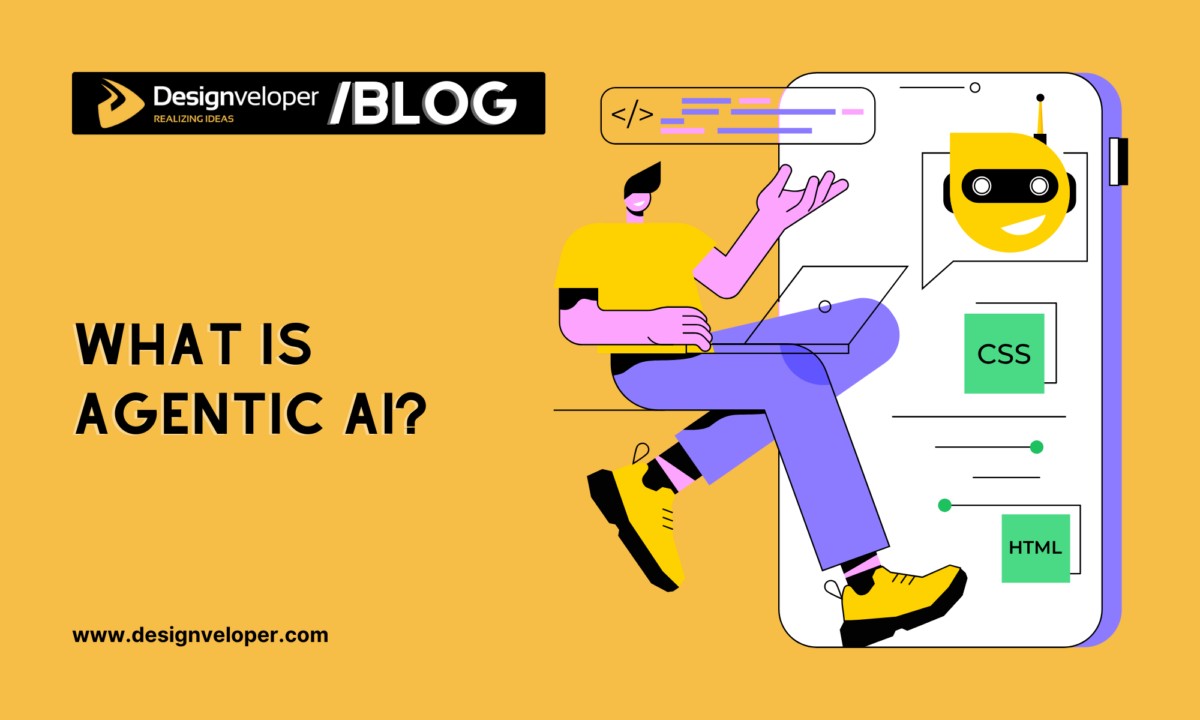
Your daily life, as a customer service agent, is often full of many repetitive, time-consuming tasks. From answering questions about the new company policies to explaining a product’s new features, these tasks take up your whole day, leaving you no time for more strategic work. Meanwhile, customer expectations are increasing rapidly. They want instant responses, 24/7 support, and personalized experiences. With labor shortages, it’s almost impossible to meet this demand. So, AI agents for customer service come in, changing the whole game. What can they do to improve customer service? How can they do so? Are there any notable AI agents to support customers? The article will help you answer these questions in detail. Keep reading!
Understanding AI Agents for Customer Service
AI agents are beyond traditional chatbots and virtual assistants we often see today. They are, by definition, autonomous systems processing customer interactions intelligently and effectively. Unlike rule-based tools that follow an act within a simple query’s scope, AI agents use reasoning and planning capabilities to understand a complex problem, plan optimal solutions, learn from mistakes over time, and refine their approaches.

Of course, AI agents haven’t reached the full level of autonomy. But they still can help human representatives automatically handle a variety of customer service tasks. It’s because these tasks are often repetitive (e.g., explaining pricing plans), and many problems are solved by humans. So when AI agents encounter similar issues, they can easily give the best solutions or responses without human intervention. For complex issues beyond their abilities, they can transfer them to the right person or department for human assistance.
With AI agents, you can solve problems, guide customers, and offer quick support across channels, without the need for additional staffing. AI agents possess the core features below to become that powerful:
Natural Language Understanding (NLU)
This advanced technology is at the core of AI agents. It helps the agents to understand not only keywords but also the intent, context, and sentiment behind these words. For this reason, the agents can figure out what customers are trying to say, such as asking a question, needing urgent help, or showing frustration.
Reasoning and Planning
Unlike traditional AI assistants, AI agents have reasoning and planning capabilities to decide what to do next after interpreting a customer’s inquiries. In particular, the agents use reasoning to find the right course of action (e.g., asking follow-up questions, giving direct answers, or guiding customers through a process). Meanwhile, planning allows the agents to break down the solutions into small steps to achieve the customer’s goal. With these abilities, AI agents not only respond to requests but also solve problems.
Contextual Awareness and Memory
AI agents can memorize previous interactions, customer interests, and even unanswered issues. This contextual awareness enables them to have ongoing, smart interactions with customers without the need for them to repeat their problems. Also, this allows the agents to offer more customized support, increasing customer satisfaction.
Multichannel Support
Your target customers might be scattered over different places, like websites, mobile apps, and social media. AI agents can work across these channels smoothly to offer personalized support. Accordingly, they can guide customers via mobile applications or answer messages on Instagram. This allows them to offer consistent services regardless of the channels your customers are using.
Diverse Integrations
AI agents can integrate seamlessly with various CRM platforms, ticketing systems, and helpdesk tools to access customer data and support your customer services efficiently. This ability enables the agents to update customer profiles, understand order histories, log voice calls, and transfer issues to human agents if needed. This creates smooth, connected experiences for your customers.
Self-Learning and Continuous Improvement
Advanced technologies, like deep learning algorithms, help AI agents become smarter over time. They can learn from interactions, customer feedback, and mistakes to adjust their behaviors and provide more accurate responses.
Top Use Cases of AI Agents in Customer Service
According to Gartner, agentic AI will autonomously address up to 80% of common customer service tasks without human supervision by 2029. This helps businesses save 30% of operational costs. Despite still being in early stages, AI agents can now do lots of things in customer service. Let’s figure out the top real-world use cases of agentic AI tools to see how they transform the way businesses communicate with their customers.

1. FAQs Handling and Troubleshooting
Answering frequently asked and repetitive questions is one of the most common and visible applications of AI agents in customer service. These questions might be about new product lines, return policies, and store opening & closing hours. Additionally, AI agents excel at troubleshooting common technical issues, such as struggling with logins. The agents help your business respond to these queries immediately, precisely, and around the clock. For this reason, your business can reduce wait times and free up human staff for more complex problems.
2. Order Tracking and Status Updates
AI agents assist customers in tracking the status and location of their orders by giving them real-time information from CRMs or order management systems. This information may involve updates on shipping progress and estimated delivery times. The agents can even notify users about delays or any disruptions.
3. Scheduling
Do customers want to schedule a demo call or book appointments with doctors? Regardless of their booking purpose, AI agents can get them covered. By accessing calendars or scheduling tools, the agents can automatically check availability and confirm appointments.
4. Complaint Resolution and Sentiment Analysis
AI agents perform sentiment analysis to identify emotions (e.g., frustration, anger, or confusion) through a customer’s tone. This allows them to not only understand a customer’s complaints and offer quick solutions but also respond with appropriate tones and empathy. In some cases, when AI agents detect a negative sentiment that their abilities hardly deal with, they can suggest transferring the issue instantly to the right human agent. This helps reduce conflicts and churn rates.
5. Feedback Collection
Many AI agents are developed to make outbound calls or conversational surveys to proactively ask for feedback based on triggers at the right time. For example, when AI agents detect updates about new medications, they can reach out proactively to a patient, perhaps 24-48 hours after the new prescription, to ask about possible side effects or blocks.
Further, AI agents can automatically classify feedback into different categories, like pricing or support quality. This allows your teams to track satisfaction metrics, identify trends, and figure out where to improve without manual tagging.
Various advanced AI agents can even act on feedback automatically. For instance, when a customer gives a low score, AI agents can say, “We’re sorry to hear that. Would you like to speak to a support specialist?” This turns feedback into an opportunity for real-time recovery and improves customer experiences.
7. Personalized Assistance and Recommendations
AI agents can analyze vast amounts of customer data (e.g., browsing behaviors or past purchases), as well as remember previous interactions with customers. This ability allows them to provide personalized support or recommendations, for example, by tailoring content or suggesting a product upgrade. This personalization makes interactions more human-like, hence increasing customer satisfaction and driving sales.
FURTHER READING: |
1. How to Use ChatGPT (Free version) Effectively for Beginners |
2. Create Chat App in Meteor in 40 Minutes |
3. 11 Best AI Chatbot Platforms to Use for 2026 |
5 Best AI Agents for Customer Service
With those useful applications of AI agents, your business can offer 24/7 responses, accelerate customer service operations, and derive data-backed insights into customer behaviors. So, what are the best AI agents for customer support these days? Let’s explore them:
1. Fin.ai
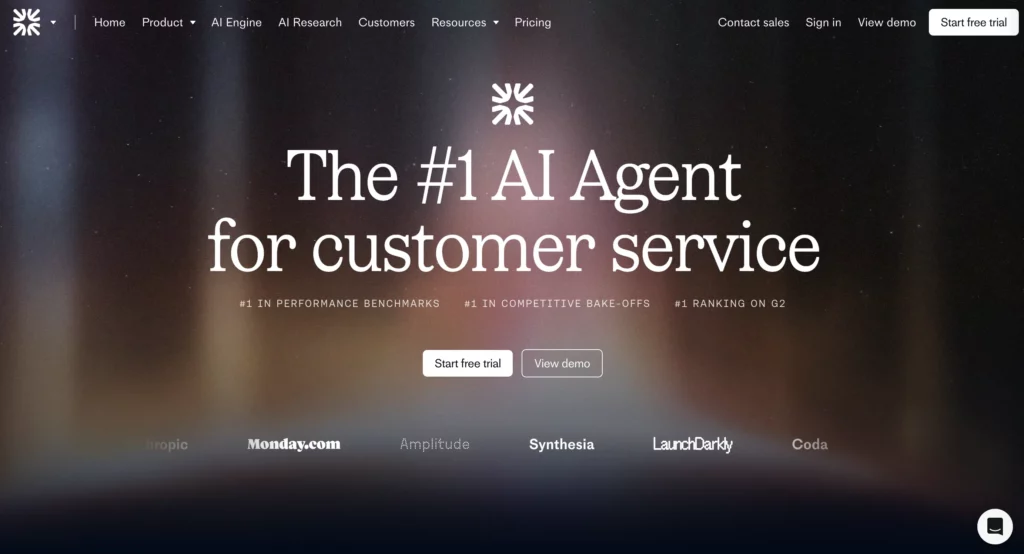
Fin AI is a high-performing AI agent for customer service. Its capabilities help your business deliver high-quality customer experiences and high resolution rates. Accordingly, Fin can answer questions across topics in any channel, whether live chats, phone calls, emails, or social media. Especially, Fin Voice can answer calls naturally, process complex queries seamleslsy, and route customers to human agents exactly when needed.
Fin allows your support teams to customize, test, and continuously improve its AI agents on one platform without coding skills. Particularly, you can train Fin AI agents to align with your brand’s voice and tone, integrate them with your support knowledge and policies, as well as configure the way they handle complex tasks.
Fin also comes with features like Topics Explorer, CX Score, and Fin Performance Report to help you analyze and test its response quality across topics. Further, it manages all knowledge sources in one centralized Knowledge Hub to access the latest information.
Pricing: Start from $0.99/resolution for at least 50 resolutions per month.
2. Sierra

Sierra has revolutionized customer experiences by offering accurate answers, solving problems, and taking proper action across any channel. Its platform enables you to develop, launch, and manage highly effective AI agents with the Agent SDK and Agent Studio.
These agents are capable of interpreting dialogue nuances to provide quick, empathetic, and personalized support across channels like phone, email, or chat. Beyond question answering, these agents can proactively address your customers’ problems (e.g., changing a reservation or processing an exchange).
Further, they can collect key information, summarize conversations, and hand them off seamlessly to your support team. They’re also integrated with continuous feedback to enhance performance and outcomes over time. Additionally, they work in alignment with your latest knowledge base, brand guidelines, and company policies to deliver accurate answers.
Pricing: Contact sales reps!
3. Cresta
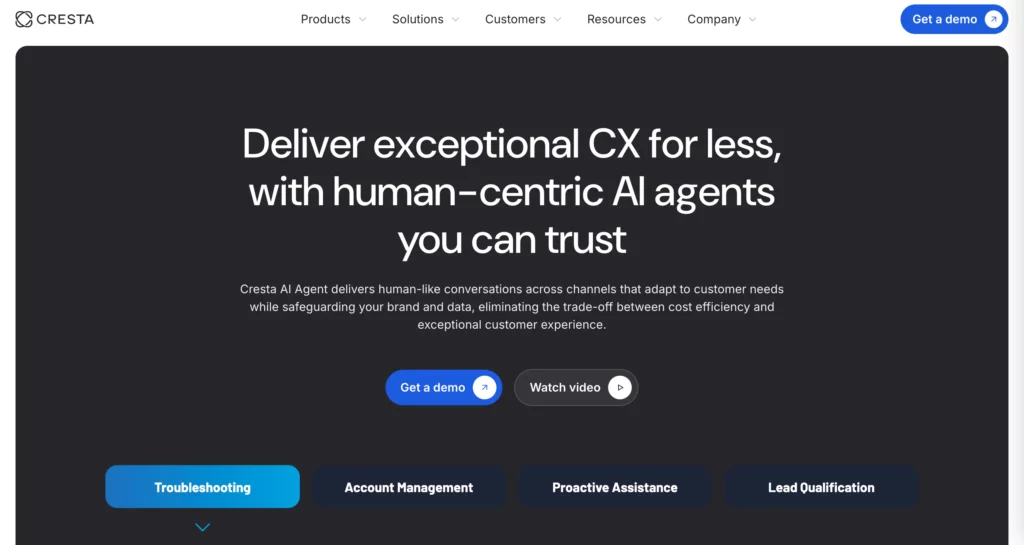
Cresta is globally recognized as one of the best generative AI platforms for contact centers. It blends the powerful capabilities of AI and humans in a unified platform to streamline customer service workflows, improve CX, save money, and drive sales.
The Cresta AI Agent performs human-like conversations across channels that meet different customer needs. Start by choosing a scenario where you need AI agents to resolve problems (e.g., proactive assistance, account management, or lead qualification). Then, you can pick up the right persona for your AI agent (e.g., professional, casual, or friendly) to align with your brand’s value and voice.
Cresta’s decentralized agentic capability allows its AI Agent to dynamically take action to resolve the most complex customer issues. From updating a customer’s address to checking their claim status, the Agent can do it well.
Pricing: Contact sales reps!
4. Chatbase
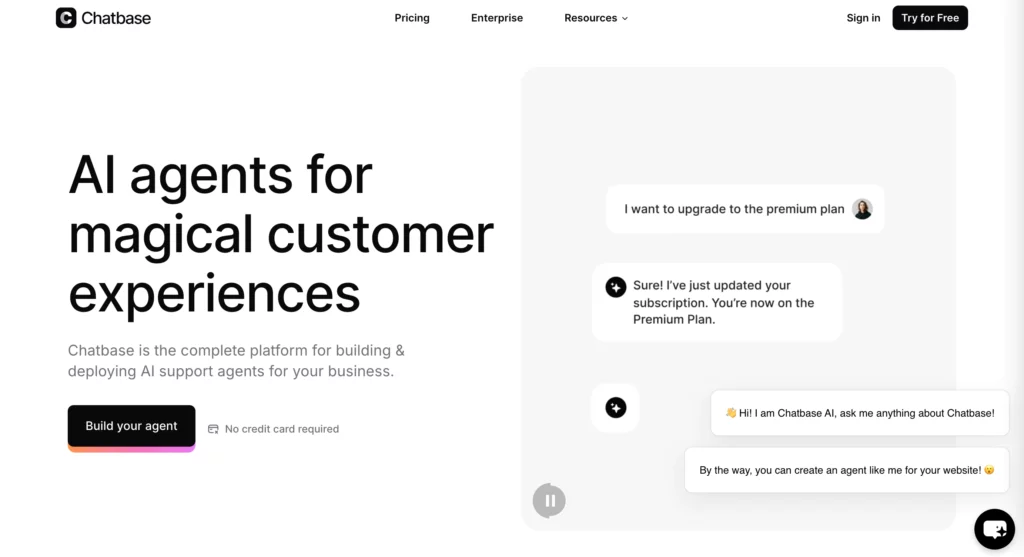
Chatbase is a comprehensive platform for your business to develop and launch AI support agents without the need for coding knowledge. Powered by large language models (LLMs) with reasoning capabilities, Chatbase’s AI agents can answer questions, handle issues, and take appropriate actions (e.g., updating a customer’s subscription or escalating queries to human agents).
The agents are trained on your company’s knowledge base and access external systems to collect real-time data for more accurate responses. Further, they can learn from previous interactions to improve continuously over time.
On Chatbase, you can also experiment with different models and configurations to choose the best setup for your use case. Besides, you can gain insights and optimize agent performance through advanced reporting and detailed analytics.
Pricing: Offer a free plan or start from $40/month for premium plans
5. Sendbird
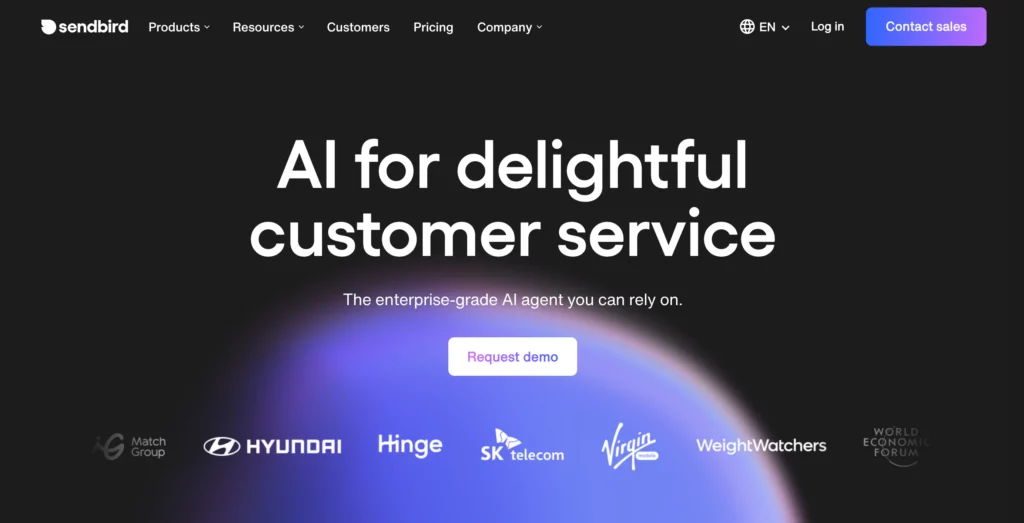
Sendbird is an enterprise-grade AI agent to delight your customer service. It can adapt to your business workflows, integrate seamlessly with your support software, and deliver fast, personalized responses across channels.
With the AI Agent Builder, you can effortlessly build, test, deploy, and evaluate AI agents in a unified platform. The agents can be developed with a personality that mirrors your brand values and voices, fed with your knowledge base and guidelines, and equipped with built-in safeguards.
Sendbird can pick up conversations exactly where your customer left off on any platform. Beyond simple tasks, it can forecast needs to proactively reach out to your customers on their favorite channels by using reasoning capabilities. Further, it continuously learns from previous interactions and outcomes to improve its performance.
Pricing: Contact sales reps!
How to Use AI Agents Effectively for Customer Support
AI agents prove truly valuable to customer service. But without the right strategy and alignment with your company goals, it’s really hard to deploy AI agents effectively across your business. That’s why, instead of simply choosing the best AI agent or customizing one for your support workflows, you should have a thoughtful strategy to get the most out of AI agents. Below are some practices you can incorporate into the strategy to leverage the agents efficiently:

1. Align AI agents with your customer engagement strategy
Don’t just consider AI agents as a quick fix for busy call centers. Instead, they only work best if they become an integral part of a larger service vision. In other words, they should support human agents towards clearly defined business goals. Therefore, before AI agent deployment, your company should clarify short-term and long-term objectives, like lowering support costs or improving customer satisfaction. This allows you to guide AI towards these goals to engage customers better.
2. Grant AI agents the right data, tools, and permissions
AI agents always need clean, high-quality, and updated data to perform effectively on specific tasks. The data can come from updated knowledge bases, core business systems (e.g., CRM tools, ERP software, or analytics dashboards), customer records, APIs, etc.
But AI agents, especially ones from third-party providers, still present some challenges, like high risks of being hacked for data leakage. That’s why considering which data, tools, and roles should be given to AI agents is crucial. This allows the agents to access necessary data for accurate responses while protecting your business and customer data.
3. Train and upskill human agents to work with AI
Remember, AI agents aren’t born to replace humans, but complement them to deliver better customer experiences. Even when AI agents are becoming more intelligent these days, they still need human involvement to fine-tune decisions and actions in some cases. That’s why your company should invest in training to ensure that support teams will collaborate well with AI. Accordingly, human agents will know exactly when and how to escalate complex tasks from AI to them. This reduces frustration on both sides and ensures the best support results.
Transforming Your Customer Service with Designveloper’s AI Solutions

The article already gave you a comprehensive overview of how AI agents improve customer service. They mostly take on routine tasks, like answering FAQs, troubleshooting common queries, and collecting customer feedback. Various AI agents for customer service are introduced these days, although they haven’t reached the full autonomy level of human experts. By integrating AI agents into your customer engagement strategy, granting them the right data and roles, as well as training human agents, you’ll achieve a big success with AI agents in customer service.
And now, do you want to build tailored AI agents to revolutionize your customer service? Are you looking for a trusted, experienced partner to realize your idea? Designveloper is here to help! With our deep technical expertise in AI development and hands-on experience across different industries, we’re confident in using the latest AI technologies to create scalable, high-quality solutions to your existing problems with customer service. We also excel at integrating AI agents into your current business systems, like CRM or ERP, to make sure they’ll pull real-time data for fast, precise responses.
Contact us now and discuss your idea further!






Read more topics
You may also like




























